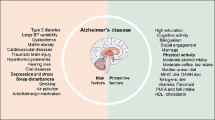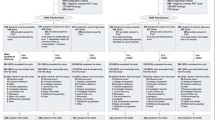Abstract
The 2018 Clinical Trials on Alzheimer’s Disease (CTAD) conference showcased recent successes and failures in trials of Alzheimer’s disease treatments. More importantly, the conference provided opportunities for investigators to share what they have learned from those studies with the goal of designing future trials with a greater likelihood of success. Data from studies of novel and non-amyloid treatment approaches were also shared, including neuroprotective and regenerative strategies and those that target neuroinflammation and synaptic function. New tools to improve the efficiency and productivity of clinical trials were described, including biomarkers and machine learning algorithms for predictive modeling.
Similar content being viewed by others
References
Hu X, Das B, Hou H, He W, Yan R. BACE1 deletion in the adult mouse reverses preformed amyloid deposition and improves cognitive functions. J Exp Med 2018;215:927–940.
Egan MF, Kost J, Tariot PN, et al. Randomized Trial of Verubecestat for Mild-to-Moderate Alzheimer’s Disease. N Engl J Med 2018;378:1691–1703.
Egan MF, Voss T, Mukai Y, et al. Results from the APECS trial. J Prev Alzheimers Dis 2018;5:S1.
Vassar R. Editorial: Implications for BACE1 Inhibitor Clinical Trials: Adult Conditional BACE1 Knockout Mice Exhibit Axonal Organization Defects in the Hippocampus. J Prev Alzheimers Dis 2019;6:78–84.
Bateman RJ, Xiong C, Benzinger TL, et al. Clinical and biomarker changes in dominantly inherited Alzheimer’s disease. N Engl J Med 2012;367:795–804.
Fagan AM, Xiong C, Jasielec MS, et al. Longitudinal change in CSF biomarkers in autosomal-dominant Alzheimer’s disease. Sci Transl Med 2014;6:226ra230.
Verma A, Yu HJ, Chen H-C, Wang CY. Active anti-amyloid immunotherapy with UB-311 vaccine: design, baseline data and study update of a Phase IIA, randomized, double-blind, placebo-controlled, 3-arm parallel-group, multicenter study. J Prev Alzheimers Dis 2018;5:S10.
Schenk D, Barbour R, Dunn W, et al. Immunization with amyloid-beta attenuates Alzheimer-disease-like pathology in the PDAPP mouse. Nature 1999;400:173–177.
Check E. Nerve inflammation halts trial for Alzheimer’s drug. Nature 2002;415:462.
Wang CY, Wang PN, Chiu MJ, et al. UB-311, a novel UBITh((R)) amyloid beta peptide vaccine for mild Alzheimer’s disease. Alzheimers Dement (N Y) 2017;3:262–272.
Paez A. AMBAR (Alzheimer’s Management by Albumin Replacement) Phase IIB/III Results.. J Prev Alzheimers Dis 2018;5:S8.
Neth BJ, Craft S. Insulin Resistance and Alzheimer’s Disease: Bioenergetic Linkages. Front Aging Neurosci 2017;9:345.
De Felice FG, Vieira MN, Bomfim TR, et al. Protection of synapses against Alzheimer’s-linked toxins: insulin signaling prevents the pathogenic binding of Abeta oligomers. Proc Natl Acad Sci U S A 2009;106:1971–1976.
Salameh TS, Bullock KM, Hujoel IA, et al. Central Nervous System Delivery of Intranasal Insulin: Mechanisms of Uptake and Effects on Cognition. J Alzheimers Dis 2015;47:715–728.
Craft S, Baker LD, Montine TJ, et al. Intranasal insulin therapy for Alzheimer disease and amnestic mild cognitive impairment: a pilot clinical trial. Arch Neurol 2012;69:29–38.
Reger MA, Watson GS, Green PS, et al. Intranasal insulin administration dose-dependently modulates verbal memory and plasma amyloid-beta in memory-impaired older adults. J Alzheimers Dis 2008;13:323–331.
Reger MA, Watson GS, Green PS, et al. Intranasal insulin improves cognition and modulates beta-amyloid in early AD. Neurology 2008;70:440–448.
Craft S, Raman R, Chow T, et al. Primary results from a Phase II/III trial of intranasal insulin: A novel multi-target molecule and delivery mode for AD therapeutics. J Prev Alzheimers Dis 2018;5:S9.
Xiao S, Zhang Z, Geng M. Phase 3 clinical trial for a novel oligosaccharide targeting multiple A-beta fragments in patients with mild-moderate AD in China J Prev Alzheimers Dis 2018;5:S10.
Potter H, Woodcock JH, Boyd T, et al. Interim safety and efficacy results of pilot trial of GM-CSF/Sargramostim in mild to moderate AD. J Prev Alzheimers Dis 2018;5:S15.
Irwin RW, Brinton RD. Allopregnanolone as regenerative therapeutic for Alzheimer’s disease: translational development and clinical promise. Prog Neurobiol 2014;113:40–55.
Irwin RW, Wang JM, Chen S, Brinton RD. Neuroregenerative mechanisms of allopregnanolone in Alzheimer’s disease. Front Endocrinol (Lausanne) 2011;2:117.
Brinton RD, Hernandez GD, Kono N, et al. Allopregnanolone regenerative therapeutic for mild cognitive impairment and mild Alzheimer’s disease: Phase 1B/2A outcomes update. J Prev Alzheimers Dis 2018;5:S12.
Baker LD, Espeland MA, Rapp SR, et al. Cocoa supplement and multivitamin outcomes study of cognitive functin (COSMOS-MIND): Design of a large randomized clinical trial. J Prev Alzheimers Dis 2018;5:S20.
Uspenskaya-Cadoz O, Alamuri C, Khinda S, et al. Machine learning algorithm helps identify non-diagnosed prodromal Alzheimer’s disease patients in general population. J Prev Alzheimers Dis 2018;5:S21.
Hampel H, Afshar M, Parmentier F, et al. Longitudinal 148-week extension study for Anavex(R)2-73 Phase 2A Alzheimer’s disease demonstrates maintained activities of daily living score (ADCS-ADL) and reduced cognitive decline (MMSE) for patient cohort on high drug concentration and confirms role of patient selection biomarkers. J Prev Alzheimers Dis 2018;5:S43.
Jimenez-Maggiora GA, Raman R, Rafii MS, Sperling RA, Cummings JL, Aisen PS. TRC-PAD: Accelerating participant recruitment in AD clinical trials through innovation. J Prev Alzheimers Dis 2018;5:S31.
Author information
Authors and Affiliations
Rights and permissions
About this article
Cite this article
Vellas, B., Bain, L.J., Touchon, J. et al. Advancing Alzheimer’s Disease Treatment: Lessons from CTAD 2018. J Prev Alzheimers Dis 6, 198–203 (2019). https://doi.org/10.14283/jpad.2019.11
Received:
Accepted:
Published:
Issue Date:
DOI: https://doi.org/10.14283/jpad.2019.11




